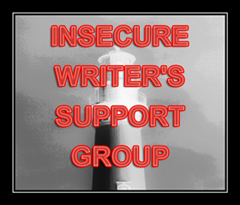 This post arose because I have just given my first critique for a fellow writer in the Insecure Writers Support Group’s Critique Circle on Facebook. And it is the first Wednesday of October, so this is my IWSG monthly post.
This post arose because I have just given my first critique for a fellow writer in the Insecure Writers Support Group’s Critique Circle on Facebook. And it is the first Wednesday of October, so this is my IWSG monthly post.
I felt that it was the perfect time to look at what the experts had to say about the critique process. So where better than starting with a useful post at IWSG on what to look for in a critique partner:
“The manuscript is polished – huzzah! Time for another set of eyes to look at it.
Beta readers/test readers are often those who are just readers of our genre. They’re great for spotting flaws in the story. But we also need skilled writers to go over the manuscript and examine the plot, the character arc, the grammar, the structure, etc. Enter–critique partners.
What should we look for in a good critique partner?”
So what should we be asking our critique partners? Well there various questions, and here are the ones that K.M Weiland suggests:
“1. Is anything confusing?
2. Are any scenes boring or repetitious?
3. Do you spot any general tics (repeated words, etc.)?
4. Do you spot any confusing plot points (let me know when and where I lose you and what needs to be clarified)?
5. Does the opening grab you?
6. Is there an appropriate balance of action with the other subplots?”
These are just the ones that she asks before the crit. partner reads the manuscript, but she has others.
There is an overlap in what one expects from beta readers and crit. partners, and Margaret Yang gives in an insight into her experiences at Jade Varden’s instructive website.
Of course we have to remember to treat our readers with respect. As Michael Kinn points out at Janice Hardy’s Fiction Workshop, there is etiquette involved:
“As beta readers we can all do with some critiquette to guide our feedback to the (hopefully) well-polished drafts writers send us. The seasoned beta reader will find out what type of critique the writer is looking for, shun infeasible turn-around promises and warn the writer of any delays. Of course, beta readers should always offer candid feedback and treat the writer with respect. These are sound rules for critiquing. But in guiding my own critiques, I try to let one piece of advice rule them all…”
‘How to Serve and Swallow Criticism’ is an art in itself, which Kristan Hoffman describes at Writers Unboxed. However, there may be reasons to ignore some of the advice from our critique groups, as Anne R. Allen explains, but with qualifications.
Those are some of the expert opinions, though not all by a long way. I have my own experiences, but, although I did belong to a writers group, I’m still near the beginning of my critique path. I tend to mix the praise with the constructive criticism. I also aim to not sit on manuscripts for ages, but realise that there are some busy readers out there.
UPDATE: Good guide to “How to Critique Fiction” by Victory Crayne at: http://www.crayne.com/howcrit.html
What is your advice?

Image courtesy of FreeDigitalPhotos.net
***
Some of you might have noticed that I missed yesterday’s post. Or you think this has combined the two posts? Well, I did think that I could count this one twice. Dang, I could have posted it yesterday, then tweaked it for today. What a missed opportunity. Would anyone have noticed?
In fact, there will be another post this week as I will be posting about the launch of One Stop For Writers, which launches tomorrow October 7th
***
The first Wednesday of every month is officially Insecure Writer’s Support Group day. We post our thoughts on our own blogs. We talk about our doubts and the fears we have conquered. We discuss our struggles and triumphs. We offer a word of encouragement for others who are struggling.
Please visit others in the group and connect with other writers – aim for a dozen new people each time.
Purpose: To share and encourage. Writers can express doubts and concerns without fear of appearing foolish or weak. Those who have been through the fire can offer assistance and guidance. It’s a safe haven for insecure writers of all kinds!
Let’s rock the neurotic writing world!
Our Twitter hashtag is #IWSG
And be sure to check out our Facebook group – https://www.facebook.com/groups/IWSG13/
We also have a t-shirt now! You can purchase it here – http://www.neatoshop.com/product/IWSG
The awesome co-hosts for the October 7 posting of the IWSG are TB Markinson,Tamara Narayan, Shannon Lawrence, Stephanie Faris, and Eva E. Solar!



Reblogged this on THE DUSKWEALD.
LikeLike
I belonged to a critique group that met at local business’s for years and I found the best critiques combined praise and things to change, or maybe, things to consider changing. We were all careful not to squash anyone’s feelings. Well most of the time. Sometimes a good, verbal kick in the pants can do wonders, but it has to come from someone the author respects.
LikeLike
Respect is the key word, Tamara. It’s hard to take knocks from someone that hasn’t earned that respect. Mind you I learnt to balance that, I had one widely published writer in my first group that so impressed me that I had problems getting anything finished.
LikeLike
“I” messages are pretty good for crits.
“I feel this character is…”
“I’m finding this section to be…”
“My grasp of this scene is…”
It lets you point out things without making it sound like the writer is in the wrong (even if they are).
LikeLike
Yes keeping it more personal opinion can temper a comment. Thanks Katty.
LikeLike
I think finding the right readers/critiquers is key as well. I’ve been through many a beta/critique pairing and not everyone has been a good fit–even in my local group, where the people know me personally. I know once person in my local group gets confused when magic is involved because she doesn’t read epic fantasy. It becomes a decision whether or not I should adjust for one person who isn’t my target audience. Maybe the fit just isn’t good. 🙂
LikeLike
See my reply below.
LikeLike
Good observation, Loni. Writers’ styles don’t always work well with each other. I temper my reactions according to where they come from. Yet even a small comment can trigger some changes that I might missed, even if the reader was unable to add anything else.
LikeLike
That was meant to be a reply to Loni.
LikeLike
Great advice! I’ve never been part of a critique group or had partners but I was just assigned critique partners through the IWSG Critique FB group. I usually use beta readers for my genre and they’ve helped me so much. I have had some bad fits or some beta readers who were unnecessarily harsh but now I know not to use them. 😉 And now I also know who I can turn to for certain genres as well.
LikeLike
The IWSG Critique FB group is such a great initiative. Glad you are involved Chrys.
LikeLike
Not sure I can properly answer that. I gave a call out for critique partners on my blog and got some great responses. Those I have now are just awesome beyond words and each one brings something new to the table.
Glad you took advantage of the IWSG Critique Circle.
LikeLike
The Circle was such a great opportunity that I had to grasp it, Up to now I’ve depended on writer friends in my old writing group, and on FB, although both avenues have worked… but not using readership.
LikeLike